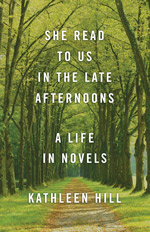 “She Read to Us in the Late Afternoons: A Life in Novels,” by Kathleen Hill
“She Read to Us in the Late Afternoons: A Life in Novels,” by Kathleen Hill
(Delphinium Books, pp 224, $24.00)
Here is a book that could easily be missed out. So delicate in tone and style that it reads like a minuet. It is precisely the finely chiseled and graceful sentences that make this sonorous book all the more moving. Its topic, on the other hand, reads more like a symphony. A multi-layered memoir, which deals with the life of books and their influence on our lives, but without ever becoming cacophonous. Its impact, however, could not be louder, so much the ideas tackled are gigantic. You would have to be tone-deaf to miss the point Hill is driving home.
“She Read to Us in the Late Afternoons” is about the rendition of a courageous young American idealist taking a teaching job in Nigeria in 1963, and who thinks she is going to remake the world. If her memoir could be a grain of sand, each chapter describes a unique universe of self-questioning, which echoes with so much truism that you will catch yourself nodding as her journey progresses, with universal truth. Big frictions are raised. The validity of a western education, which displace traditional values and cultures, in the name of economic development. It is not just the horror of the ivory trade, as in “Heart of Darkness,” or the indoctrination of charmed African workers laboring merrily in coffee plantations as in “Out of Africa,” but also the disruptive voice of “When Things Fall Apart” which departs from the accepted discourse of obvious legacy of the white man’s burden. And Hill does not fall in the trap of explaining all the whys.
What makes this memoir so captivating is that the journey is undertaken through fiction novels. Hill excels at navigating through the labyrinth of her trajectory back to the source of the long river of colonialism, starting back at Badagry. What is it like to read “Portrait of a Lady” thousand miles away from home, in the darkest jungle? Can books really teach us anything if they taint our reality with fiction from other worlds? Of course, there is a chapter on “Madame Bovary,” who epitomizes de facto the issue of self-deception. Chances are we have all been infected with Bovarism somewhere in our life. Though a work of non-fiction, “She Read to Us in the Late Afternoons” come in a world increasingly globalized to make us ponder over our decisions and lives. Is anyone immune at all? Are you living your life or the one expected from you? “She Read to Us in the Late Afternoons” will keep you pondering.
